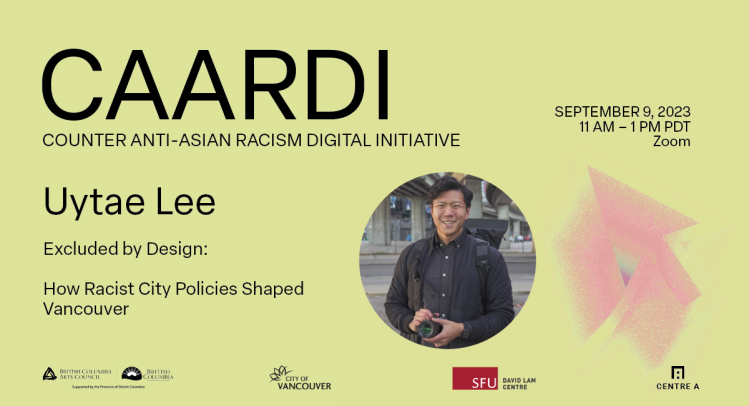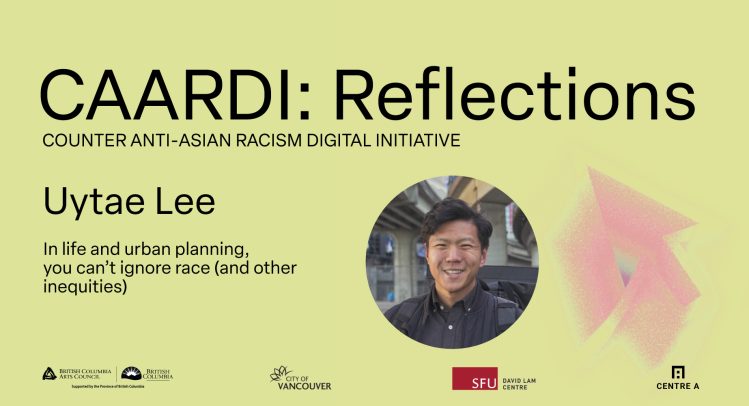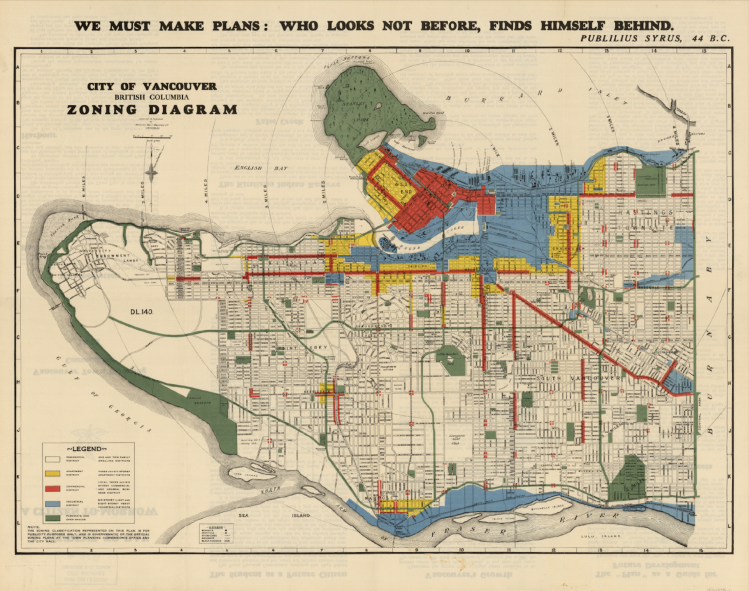Vancouver International Centre for Contemporary Asian Art

Uytae Lee: Excluded By Design: How Racist City Policies Shaped Vancouver
Saturday, September 9, 2023, 11 AM – 1 PM PDT
Centre A (Zoom)
–
Register HERE.
–
Join us for a conversation with urban planning video journalist Uytae Lee. Drawing from research and history, we will explore the influence of racism and exclusion in creating Vancouver’s housing policies and how we can begin to repair this legacy today.

In life and urban planning, you can’t ignore race (and other inequities)
I’m incredibly grateful to Centre A for hosting me earlier this fall to speak about race in my work as a filmmaker covering urban planning issues. I’ll admit that I’ve only recently begun to grapple with issues of race and inequities in both my personal and professional life.
Urban Planning
When I first started learning about urban planning, it all appeared relatively straightforward. To give a sweeping and simplified summary, most North American cities today face the challenge of rectifying decades of suburbanization that created sprawling, car-dependent neighbourhoods, and changing that today requires adding housing density, mixing land-uses, and fostering alternatives to automobiles such as public transit and active transportation. Sort of easy enough… right?
But the more I’ve explored these issues, the more I’ve found them to be much more complicated and disconcerting.
For example, much of the low-density “sprawl” in our cities today is the result of zoning bylaws that prevent apartments from being built in single family neighbourhoods, which were shaped by a desire to divide neighbourhoods by class.
In fact, the original author of Vancouver’s zoning bylaw, Harland Bartholomew, was famous for using zoning to segregate cities in the U.S. When hired by the city of St. Louis in 1916, he surveyed the race of various building’s occupants throughout the city and drafted a zoning ordinance that would “estimate where African Americans might encroach so the commission could respond with restrictions to control their spread.” (Richard Rothstein, The Color of Law)
By the time Bartholomew was hired to introduce zoning to the City of Vancouver in 1927, it was no longer legal to create zoning ordinances that segregated by race. But to some extent, it wasn’t necessary for zoning to segregate. Property owners could create land covenants that barred the sale of their land to people of certain ethnic backgrounds, and the Chinese Immigration Act banned Chinese immigrants to Canada until 1947 (in fact, the restriction of Chinese immigrants only really ended after the federal government eliminated immigration restrictions based on national origins in 1962).
Rather than explicitly mentioning race, cities’ zoning bylaws shifted their language to focus instead on dividing cities into different types of housing. In Vancouver, according to Bartholomew, the city’s zoning bylaw was written “largely to prevent the intrusion of apartment houses in single or two-family residential areas” (Harland Bartholomew, A Plan for the City of Vancouver), effectively ensuring that the city’s spacious single detached neighbourhoods would never see an apartment building for the next century.
Today, these zoning bylaws create quiet, safe, and spacious neighbourhoods for residents who can afford them while concentrating everyone (and everything) else into certain urban pockets of the city.
I want to be careful and say that this isn’t a cut-and-dry case of racism and classism. Zoning came about for many well-intentioned and pragmatic reasons as well; it was a response to overcrowding in apartments, and it separated residential neighbourhoods from industrial districts that were often polluted and noisy.
Nonetheless, I’ve come to understand that it’s impossible to extricate issues of race and class from the development of the zoning ordinances that cover most cities across North America today.

Graphic: The first zoning ordinance for the City of Vancouver, 1927
Life
My personal relationship to race, in many ways, follows a similar trajectory.
Growing up, I found the easiest way to grapple with my racial identity was to try my best to ignore it. I hid my Asian identity where I could, focusing on fitting in as much as possible and earning the respect of my peers.
This wasn’t always easy. On a long carpool drive home to Langley after a school band tour in Kelowna, I sat shotgun next to a classmate’s mother while she ranted about how “international students like you are ruining the country” and “you don’t bother learning our language and traditions”, and other diatribes. At the time, I laughed it off.
But writing about it now, I can tell how much this period affected me. With some maturity comes the realization that this coping mechanism had its downsides. It’s made it more difficult for me to trust others, and to believe that people genuinely appreciate me for who I am beyond my utility to them or my accomplishments.
Revisiting this phase of my life is often painful, but reflecting on it and acknowledging the hurt it caused has helped me heal. It’s helped me understand who I am today and how I can grow as a person.
In the same way, I believe that it’s necessary to acknowledge and reflect on the troublesome history behind our city policies as well. Though it might be uncomfortable, revisiting our complicated past and its influence on the challenges we face today is the first step towards creating deep and meaningful change in our cities.
–
Uytae Lee is the creative mind behind ‘About Here’, a YouTube channel dedicated to covering the complex issues surrounding our cities. In addition to the channel, Uytae produces the CBC series ‘Stories About Here’. Check out more of his work at:
YouTube: youtube.com/abouthere
Website: abouthere.ca
Accessibility: The gallery is wheelchair and walker accessible. If you have specific accessibility needs, please contact us at (604) 683-8326 or info@centrea.org.
Centre A is situated on the unceded territories of the Musqueam, Squamish, and Tsleil-Waututh peoples. We honour, respect, and give thanks to our hosts.






